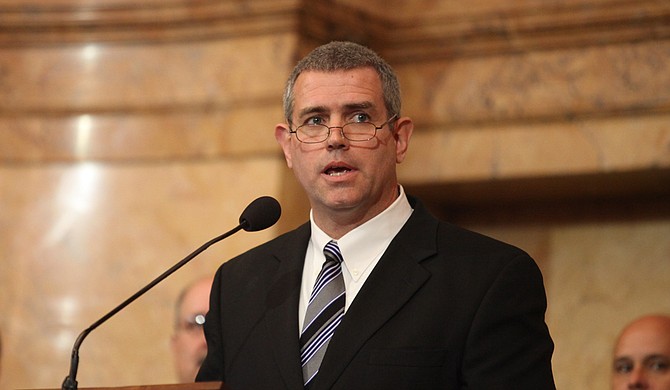During a separate end-of-session interview, House Speaker Philip Gunn didn't blame Democrats for killing a tax cut, as Republican leaders had been doing until then. Instead, he faulted the other chamber for not accepting the House proposal. Photo courtesy Amile Wilson
JACKSON, Miss. (AP) — This is a year of modest accomplishments for the Mississippi Legislature.
During their three-month session that just ended, lawmakers outlawed texting while driving; authorized people to carry guns in purses or briefcases without a concealed-carry license; and eliminated the $5 vehicle inspection sticker that, for many drivers, had become more of an annual annoyance than a genuine way to keep clunkers off the road.
Facing pressure from conservatives who distrust the Common Core academic standards that Mississippi and most other states adopted in recent years, legislators voted to create a 15-member commission to examine what schools should teach. The group will make recommendations to the state Board of Education, but the board isn't obligated to accept the suggestions.
Mississippi has a longstanding problem of low graduation rates for special-education students, and legislators created $6,500 vouchers that some families of those students can use for private school tuition, tutoring or other educational services outside the public schools. The state has about 66,500 special education students, and the voucher program is limited to 500 students the first year. Over five years, it will expand to 2,500. Supporters argued that a small program is better than nothing, while opponents said the state would better serve special-education students by hiring lawyers to advocate on their behalf as they seek services they need from public schools.
Legislators funded the second year of a teacher pay raise, as expected.
House and Senate leaders boast that they budgeted a record amount of money for education. But, Nancy Loome, leader of a public education advocacy group called the Parents' Campaign, says legislators still fell more than $201 million short of fully funding the Mississippi Adequate Education Program, a formula that was put into law in 1997 that is designed to give schools enough money to meet midlevel academic standards.
This is an election year, with eight statewide offices and all 174 legislative seats on the ballot. Most incumbents are seeking re-election, and the state's top three Republicans — Gov. Phil Bryant, Lt. Gov. Tate Reeves and House Speaker Philip Gunn — were eager for the Legislature to enact some sort of tax cut. That didn't happen.
The Senate passed a plan that would have reduced a portion of the income tax and phased out the business franchise tax. Price tag: $382 million.
The House passed a plan that would have phased out the personal income tax over at least 15 years, with bits disappearing in years when the economy is growing. It would have been the biggest tax cut in state history, with a price tag of about $1.7 billion a year, based on current income tax collections.
The two chambers reached a $555 million compromise that would've reduced individual and corporate income tax rates, phased out the franchise tax and reduced the rate of self-employment taxes.
Tax proposals need a 60 percent majority to pass. The compromise passed the Senate but died in the House amid solid opposition from Democrats who said reducing revenue could create funding problems for schools, transportation and other state services.
"It's the biggest disappointment of the 2015 session," Reeves said. "We spent a lot of time and effort and political capital to convince members of the importance of sending money back home to our taxpayers."
During a separate end-of-session interview, Gunn didn't blame Democrats for killing a tax cut, as Republican leaders had been doing until then. Instead, he faulted the other chamber for not accepting the House proposal.
"I thought it was a good plan," Gunn said. "And, unfortunately, it didn't survive in the Senate."
Copyright Associated Press. All rights reserved. This material may not be published, broadcast, rewritten, or redistributed.


